Canada Urges Change In Air Accident Probes After Iran's Downing Of Jetliner
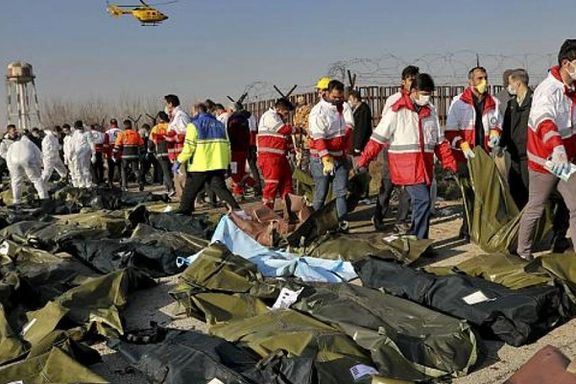
Canada says changes are needed in global rules about air accident investigations such as the 2020 downing of a Ukrainian jetliner by Iran.

Canada says changes are needed in global rules about air accident investigations such as the 2020 downing of a Ukrainian jetliner by Iran.
A government source said on Monday that Canada is expected to call on Safer Skies forum for improving international rules governing investigations for air accidents.
According to the source, Canadian Transport Minister Omar Alghabra is to tell the forum that reforms are especially needed in cases where the main country probing a crash, caused or participated in the downing of the aircraft.
Hosted virtually by Transport Canada and the Safer Skies Consultative Committee on Tuesday and Wednesday, the forum brings international representatives and the civil aviation industry, including the International Air Transport Association, to mitigate airspace risks over conflict zones.
Canada's Transportation Safety Board (TSB), an independent agency, called for such changes in 2021, arguing Iran's downing of flight PS752 showed the limitations of current rules.
The TSB argued that under those rules, Iran retained overall control of the investigation into the crash which killed all 176 onboard, while the country's military was implicated in the event leading to an "unprecedented" situation.
After three days of denial, Tehran claimed Revolutionary Guards “accidentally” shot down the Boeing 737 jet by two surface-to-air missiles in the tense aftermath of Iran's missile attack on United States military bases in Iraq on January 8, 2020.
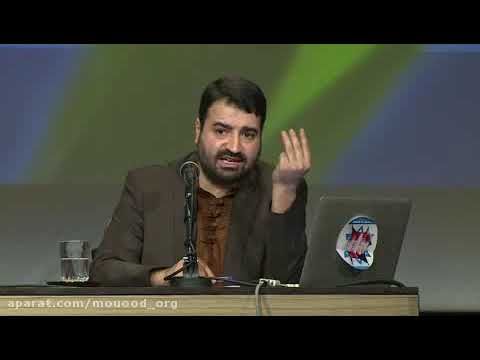
An Iranian official who is an advisor to the parliament for plan to restrict the internet has openly talked about Iran’s network of fake accounts and disinformation campaigns.
In a recent interview, Ruhollah Mo’men-Nasab -- a former head of Culture Ministry’s Digital Media Center and the current secretary of cyberspace activities of the Popular Front of Islamic Revolution Forces political party – talked about their tactics to disrupt the flow of information and tarnish the image of activists.
He is an outspoken opponent of social media platforms and free internet access, describing them as espionage tools, and has been a consultant and staunch supporter of the bill pushed by hardliners to limit internet in Iran, entitled 'Legislation to Protect Cyberspace Users'.
In a video of his remarks that surfaced last week, Mo’men-Nasab seems quite pleased with the result of their misinformation campaigns, elaborating that they made numerous counterfeit twitter accounts with photos and names of influential rights and political activists “who were against the revolution and interests” of the regime.
Describing the disinformation network as part of a psychological warfare, Mo’men-Nasab said they have made software for the tweets and retweets and had created at least 256 accounts to make the process faster and more effective.
Twitter and Facebook have been suspending or shutting down hundreds of Iranian fake accounts over recent years, suspected of spreading disinformation, even in during elections in the United States.
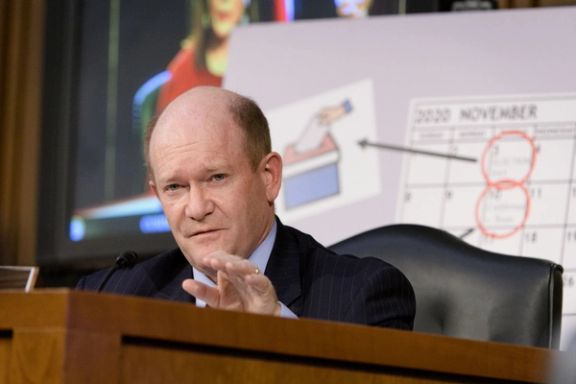
Iran’s Revolutionary Guard is a “dangerous and destabilizing actor” and it is not clear why the United States would remove their terrorist designation, Senator Chris Coons told Iran International on Monday.
In the final stages of negotiations to revive Iran’s 2015 nuclear agreement, Tehran has been demanding that the US remove the Revolutionary Guard (IRGC) from its Foreign Terrorist Organization (FTO) list. The Biden Administration has not decided yet, but most Senate Republicans and some Democratic lawmakers have opposed such a move.
Sen. Coons said that although he does not have full information on the matter, “it would have to be something very significant” to warrant IRGC’s delisting.
Regarding the Islamic Republic in general, Coons said it is doing at least three bad things: Consistently and at large scale repressing the human rights of the Iranian people; exporting violence in the region through support for Hezbollah, for Houthis, through the IRGC and other groups…and continuing to develop ballistic missile technology that threatens the whole region.
Sen. Coons, who is a close supporter of President Joe Biden and is not opposed to his policy of reviving the JCPOA, said that besides nuclear enrichment, in three other areas Tehran’s “behavior has got worse, not better over the last couple of years.”
He maintained that these issues should be addressed in future negotiations, because focusing just on the nuclear issue “would be a miss.”
“A successful deal should address a whole spectrum of what they do, all of them. That does not seem to be on the agenda of what Iran is willing to discuss,” the Senator added.
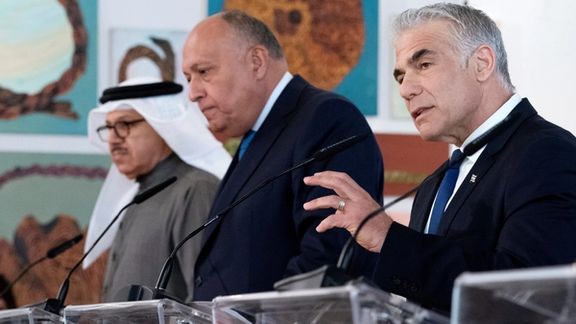
Iran’s foreign ministry has harshly condemned the historic Negev Summit between foreign ministers of four Arab states, Israel and the US Secretary of State.
Calling the gathering "an evil meeting in the occupied territories," spokesman Saeed Khatibzadeh said the summit of foreign ministers of Israel, Egypt, the United Arab Emirates, Bahrain, and Morocco, also attended by the US Secretary of State Antony Blinken, was a "betrayal of the cause of Palestine".
The participants in the summit met on Monday to display their unity against Iran. The Arab states also used the rare event to press Israel to return to the long-stalled peace talks with the Palestinians.
Tel Aviv says the event would be repeated and expanded. "This new architecture - the shared capabilities we are building - intimidates and deters our common enemies, first and foremost Iran and its proxies," Israeli Foreign Minister Yair Lapid said Monday alongside his US, Emirati, Bahraini, Moroccan, and Egyptian counterparts.
"As neighbors and, in the case of the United States, as friends, we will also work together to confront common security challenges and threats, including those from Iran and its proxies," Lapid, who initiated the summit said.
"Any move to normalize and establish relations with the terrorist Zionists and the occupiers of al-Quds (Jerusalem) is a stab in the back of the oppressed Palestinian nation and a gift to the child-killing Israeli regime to continue the killing of the [Palestinian] people and occupation of their land," Khatibzadeh said.
According to the Jerusalem Post, Blinken clarified behind closed doors that the US has not made a final decision regarding the removal of the Iranian Revolutionary Guards (IRGC) from its Foreign Terrorist Organization (FTO) list, which all the five other countries strongly opposed.

History has proven that the "process of compromise and submission" has brought its advocates "nothing but defeat and humiliation," Khatibzadeh said while reiterating that Iran is prepared to cooperate with regional countries and expand its relations with them "to counteract the Zionist and American plots that aim to sow discord and spread instability in the West Asia region."
Tehran’s harsh words came as it has been negotiating for almost a year with Western powers to revie the 2015 nuclear agreement, JCPOA. The last main hurdle is Iran’s demand to remove the IRGC from the US terrorism list.
The UAE, Bahrain and Morocco normalized ties with Israel under a 2020 US initiative known as the Abraham Accords.
On Monday, in an unattributed commentary entitled "Some Truths About the Historical Meeting of Delusional [Leaders] At Negev Desert", Nour News website tried hard to downplay the importance of the meeting and claimed the summit only revealed that Israel is not able to create a coalition against Iran and the "resistance [front]".
The ‘resistance front’ is a term coined by Tehran to describe its allies and proxies throughout the region.
"Iran's recent attack on the Mossad base in Erbil and intensification of the missile and drone attacks of [the Houthis of] Yemen on strategic locations in Saudi Arabia and the United Arab Emirates in recent days revealed that no plot can stop the resistance front in fulfilling security and stability in the region and counteracting the mercenaries of the West," Nour News which is affiliated to the secretary of Iran's Supreme National Security Council (SNSC), Ali Shamkhani, wrote.
"All this shows the fact that the Resistance [Front] led by the Islamic Iran is now the main player in the region," the commentary said.
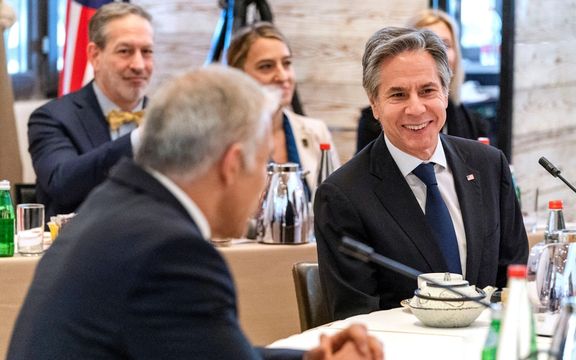
The United States, Israel and four Sunni Arab countries concluded two days of talks on Monday, vowing to expand and make the ‘Negev Summit’ a “permanent forum.”
Wrapping-up the landmark gathering Monday at Sde Boker, Negev, those taking part said the forum would build commercial and security ties with other Sunni Arab states. Unlike Bahrain, Morocco and the UAE, Saudi Arabia has held back from ‘normalization’ with Israel, which Arab League policy conditions on Israel recognizing Palestinian statehood.
“We are today opening a door before all the peoples of the region, including the Palestinians, and offering them to replace the way of terror and destruction with a shared future of progress and success," Israeli foreign minister Yair Lapid said.
"This new architecture -- the shared capabilities we are building -- intimidates and deters our common enemies, first and foremost Iran and its proxies," Lapid added alongside his counterparts from the United States, United Arab Emirates, Bahrain, Morocco and Egypt.
The summit participants decided to make it into a “permanent forum”, Lapid said, adding that its doors were open to “all the peoples of the region, including the Palestinians".
Expressing US commitment to reviving the 2015 Iran nuclear deal, which Israel and some Gulf Arab states oppose, Secretary of State Antony Blinken said the US would work with “friends…to confront common security challenges and threats, including those from Iran and its proxies.”
"As neighbors and, in the case of the United States, as friends, we will also work together to confront common security challenges and threats, including those from Iran and its proxies”, Blinken said.
The UAE, Bahrain and Morocco normalized ties with Israel under the 2020 US-mediated Abraham Accords. In 1979, Egypt became the first Arab state to make peace with Israel.
Bahrain Foreign Minister Abdullatif Al Zayani described the discussions as helpful to fend off Iranian-backed groups like Hezbollah. "Of course, part of this process will be renewed efforts to resolve the Palestinian-Israeli conflict," he added.
As the four Arab states’ foreign ministers gathered in Israel to discuss the Iranian threat with the United States, Arab gunmen killed two Israeli policemen Sunday night.
Iran’s Fars news agency, which is affiliated to Iran’s elite Islamic Revolutionary Guard Corps (IRGC),splashed a headline on its website saying Hezbollah congratulated the “martyrdom” operation.
Morocco's Foreign Minister Nasser Bourita said on Monday that his attendance at the meeting in Sde Boker was the "best response to such attacks”.
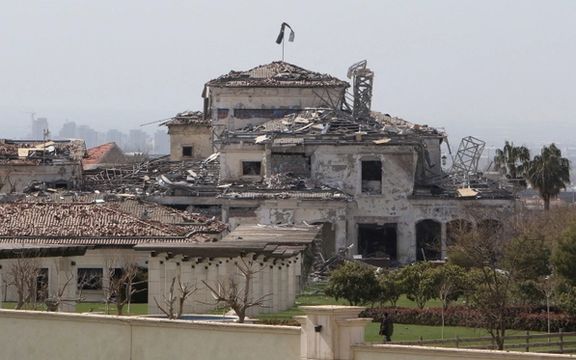
The purpose of an Iranian missile strike on Erbil in Iraq this month might have been meant to derail a gas pipeline project, an exclusive Reuters Report says.
A plan for Iraq's Kurdistan region to supply gas to Turkey and Europe - with Israeli help - is part of what angered Iran into striking the Kurdish capital Erbil, Iraqi and Turkish officials say.
The March 13 attack on Erbil came as a shock to officials throughout the region for its ferocity and was a rare publicly declared assault by Iran's Islamic Revolutionary Guards Corps (IRGC).
Many were surprised that the attack took place amid nuclear talks with Iran and at a time when Tehran has been demanding that the United States lift sanctions imposed on the IRGC.
The IRGC said the strike hit Israeli "strategic centers" in Erbil and was retaliation for an Israeli air raid that killed two of its members in Syria. There were also hints that the attack was in retaliation for an Israeli drone attack in February that destroyed an IRGC drone base in Western Iran.
The choice of target, however, baffled many officials and analysts. Most of the 12 missiles hit near the villa of a Kurdish businessman involved in the autonomous Kurdistan region's energy sector.
Iraqi and Turkish officials who spoke to Reuters on condition of anonymity this week said they believe the attack was meant as a multi-pronged message to US allies in the region - but that a key trigger was a plan to pump Kurdish gas into Turkey and Europe, with Israel's involvement.
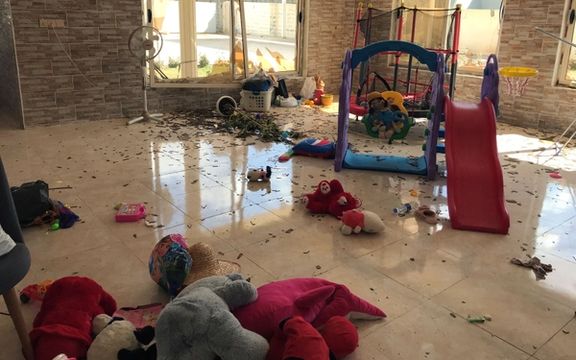
"There had been two recent meetings between Israeli and US energy officials and specialists at the villa to discuss shipping Kurdistan gas to Turkey via a new pipeline," an Iraqi security official said.
A senior Iranian security official told Reuters the attack was a "multi-purposed message to many people and groups. It's up to them how to interpret it. Whatever (Israel) is planning, from energy sector to agriculture, will not materialize."
Two Turkish officials confirmed that talks involving US and Israeli officials recently took place to discuss Iraq supplying Turkey and Europe with natural gas but did not say where they took place.
The Iraqi security official and a former US official with knowledge of the plans said the Kurdish businessman whose villa was hit by the Iranian missiles, Baz Karim Barzanji, was working to develop the gas export pipeline.
The disclosure puts Iran's attack on Erbil in the context of regional energy interests, rather than Israeli military attacks on the IRGC, as widely reported.
Israel's foreign ministry said it was not familiar with the matter. Barzanji did not immediately respond to a Reuters request seeking comment.
The office of Iraqi Kurdish President Nechirvan Barzani denied any meetings with US and Israeli officials to discuss a pipeline took place at Barzanji's villa. The Kurds deny there is any Israeli military or official presence in their territory.
TURKEY-ISRAEL RAPPROCHEMENT
The Iraqi, Turkish and Western sources spoke to Reuters mostly on condition of anonymity because they are not allowed to give statements to the media.
They said the move comes as a politically sensitive time for Iran and the region: the gas export plan could threaten Iran's place as a major supplier of gas to Iraq and Turkey while its economy is still reeling from international sanctions.
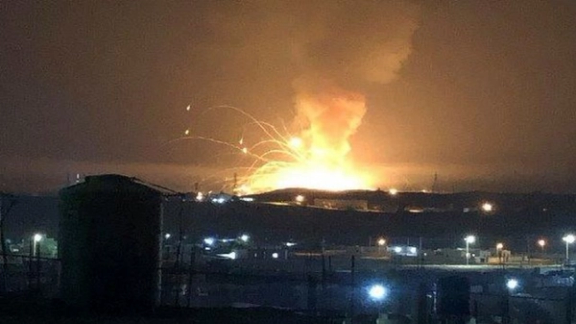
It also comes as Israel, Iran's biggest enemy in the region, and Turkey are strengthening ties and looking at further energy cooperation as sanctions on Russia over its invasion of Ukraine threaten severe shortages across Europe.
Iran is also a close ally of Russia and the disruption of a plan to supply gas to Europe could also harm Moscow’s prominent role as a major supplier to the continent.
Turkish President Tayyip Erdogan said last month that Turkey and Israel can work together to carry Israeli natural gas to Europe. Erdogan also met Barzani and said that Ankara wants to sign a natural gas supply deal with Iraq.
"The timing of the attack in Erbil is very interesting. It seems it was more directed at northern Iraq's energy exports and possible cooperation that would include Israel," one of the Turkish officials said.
"Some talks were held for northern Iraq natural gas exports, and we know that Iraq, the United States and Israel were involved in this process. Turkey supports this too," the official added.
The Iraqi security official said at least two meetings to discuss the issue, with US and Israeli energy specialists, had taken place at Barzanji's villa, which he said explained the choice of target for Iran's missile strike. No one was seriously hurt in the attack, but the villa was severely damaged.
An Iraqi government official and a Western diplomat in Iraq said that Barzanji was known to host foreign officials and businessmen at his home and that they included Israelis.
The Iraqi security official and the former US official said Barzanji's KAR Group company is working to expedite the gas export pipeline. The new pipeline would eventually connect to one that has already been completed on the Turkish side of the border, the former US official said.
KAR Group built and manages the Kurdish region's domestic pipeline, the Kurdistan presidency's chief of staff Fawzi Harir said. It also owns a third of Kurdistan's oil export pipeline under a lease agreement. The rest is owned by Russia's Rosneft.
Based on report by Reuters